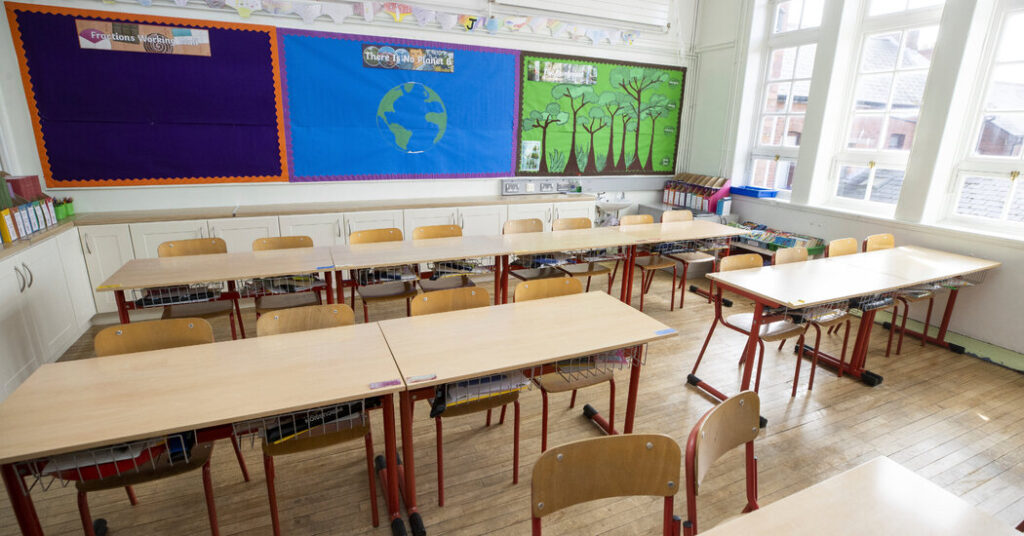A court case that began with two parents concerned about the Christian teaching their daughter was receiving at school ended Wednesday with a landmark judgment that could transform the place of religion in schools in Northern Ireland.
The Supreme Court of the United Kingdom ruled that the religious curriculum in Northern Ireland’s public schools was unlawful because it promoted Christianity as an absolute truth and did not teach religion in an “objective, critical and pluralistic manner.”
The court said in its judgment that the curriculum breached the rights of the child, who is now 11, and of her parents, who had challenged the legality of religious education and collective worship at her Belfast elementary school.
The family, which was granted anonymity by the court, has no religion and is, “broadly speaking,” humanist in its outlook, the court ruling said.
The ruling will force the government in Northern Ireland to rethink the way that religious education is taught in public schools and ensure that the study of other faiths is included in elementary education.
The court said that its ruling was “not about whether Christianity should be the main or primary faith that pupils learn about in schools in Northern Ireland.” It acknowledged that, “historically and today, Christianity is the most important religion in Northern Ireland,” and that therefore it was within the Department of Education’s mandate to make knowledge of Christianity the focus of its curriculum.
It said, however, that the failure of the syllabus to teach children about other faiths, and to think objectively about religion, meant that it was in breach of the European Convention on Human Rights, which guarantees the right to freedom of religion.
Northern Ireland Humanists, a charity working on behalf of nonreligious people, called the judgment a “historic win.”
Others expressed disappointment.
“Christian teaching and values have long been part of school life in Northern Ireland, and we will continue working to ensure they are protected,” Carla Lockhart, a lawmaker from the main Protestant party in Northern Ireland, the Democratic Unionist Party, said in a social media post on Wednesday.
The judgment also illustrates the gradual loosening of the ties between church and state in a place where the two institutions were once closely intertwined.
For decades, all schools under the control of Northern Ireland’s Department of Education have provided religious education and a daily act of worship. According to the official curriculum, schools do not have to teach children about the existence of other religions alongside Christianity until they are between 11 and 14 years old.
The current curriculum was introduced in 2007 and was written not by the Department of Education but by representatives of four churches: the Catholic Church, the Church of Ireland, the Presbyterian Church and the Methodist Church.
The official syllabus begins, “Learning Objective 1: The Revelation of God.”
The 38-page document outlines how religion should be taught, including detailed teaching on Jesus’ life, miracles, key events in the gospels and the function of prayer, which it calls “a way of talking to God so that we can thank him, praise him, say sorry and ask for help.”
According to the latest census, in 2021, about 46 percent of Northern Ireland inhabitants said they were Catholic or from a Catholic background, while about 43 percent were from a Protestant or other Christian background. About 17 percent of people said they were nonreligious, up from 10.1 percent in 2011, and 1.5 percent were from non-Christian religions.
The ruling on Wednesday confirmed the finding of a lower court, which had said that an option the school offered of withdrawing the child from religious education and worship, which is required by law, was not enough to resolve the underlying problem. The girl’s parents had argued that taking her out of religious lessons and assemblies could lead to her being isolated or bullied.
Darragh Mackin, the lawyer who represented the girl and her family, called the decision “a watershed moment for educational rights in this jurisdiction.”
In a statement, he said, “The Supreme Court has confirmed that all children are entitled to an education that respects their freedom of thought, conscience and religion.”
The case began in 2019, when the parents wrote a letter to their daughter’s school principal. They said that their daughter, who was then under 6 years old, had begun praying before mealtimes and had told them that she believed that God made the world, contradicting their beliefs. The school responded that it would continue to teach Bible-centered religion as it always had, following Northern Ireland’s mandatory curriculum.
Bishop Donal McKeown, the departing bishop of Derry, told BBC News in an interview that he was not surprised by the decision. “Northern Ireland has changed a lot since the last core curriculum was put together, and I think it is certainly a time for a revision of what we teach and how we teach as the core curriculum,” he said. “So in that sense, I’m quite sanguine about the whole thing.”
The post Northern Ireland Must Change How Its Schools Teach Religion, Court Says appeared first on New York Times.




